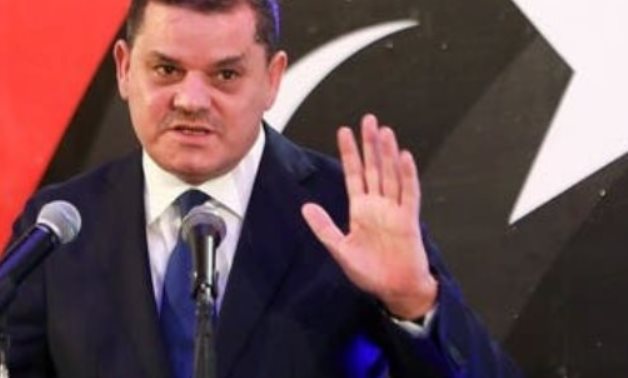
Libya’s Prime Minister Abdulhamid Dbeibeh, speaks during a news conference in Tripoli, Libya February 25, 2021. (Reuters)
CAIRO -25 April 2020: Head of the Libyan National Unity Government, Abdel Hamid Dbeibeh, fired all the ministers appointed by previous governments, in preparation for the appointment of creative figures.
This came as per a decision stating the prime minister of the national unity government has excused all secretaries of the ministries, appointed by the outgoing Fayez Al-Sarraj government and previous governments, of their duties.
A number of the secretaries of Al-Sarraj’s ministries were accused of financial and administrative corruption, and their files were referred for investigation by the Attorney General. Some of them were arrested, while others fled abroad, such as the secretaries of the ministries of finance, education, local government, and health.
Al-Dabaiba is set to appoint the secretaries of his 27 ministries, and it is expected that he will be placed under great pressure from parliamentarians and leaders from the Supreme Council of State, to push figures close to them to fill these positions. Al-Dabaiba will likely prepare his list according to the geographical criterion and the principle of distribution of positions between the three regions.
The new Libyan government took office about a month and a half ago and has already begun to cancel some decisions of the outgoing Government of National Accord, as it canceled the mandate of the Coronavirus Crisis Management Committee due to suspicions of corruption, and a new committee was formed to manage the health crisis.
Al-Dabaiba also canceled all decisions and procedures issued by Al-Wefaq and the interim governments, issued after March 10, which is the date his government obtained confidence from the House of Representatives. Al-Dabaiba was sworn on March 15, to lead the war-torn country’s transition to elections in December 2021, after years of chaos and division.
The North African nation descended into conflict after dictator Muammar Qaddafi was toppled and killed in a NATO-backed uprising in 2011, resulting in multiple forces vying for power.
A United Nations-supervised process is aimed at uniting the country, building on an October cease-fire between rival administrations in the country’s east and west.

Comments
Leave a Comment